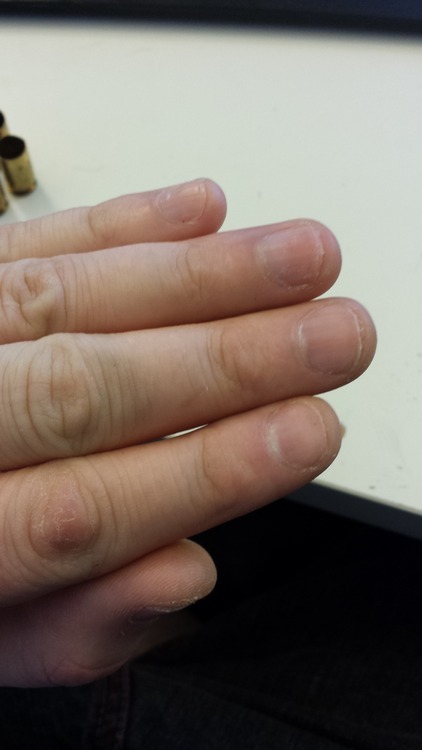INTP. cp6w5 (684) sp/sx. RCUEI. Slytherin. Posting whatever strikes my fancy. Ask if you want to know more. Header image by @vegainzandcrossfits
Don't wanna be here? Send us removal request.
Text
Fresh start.
Need a fresh start, find me here.
I'll leave this up, but hopefully be more active on the new blog.
30 notes
·
View notes
Note
You are an INTJ my dude, don't be so delusional
Thanks for your input! Thus far all the people I've asked for help typing myself have tended to suggest I'm a Ti-dom, usually an INTP. I've gotten ISTP, and on one occasion ISTJ. There's only been one person who's thought I'm an INTJ before.
But I can see where you might be coming from. However, I disagree. My approach to life is NOT Te. I get way too caught up trying to perfect ideas and don't get enough done. But I'd love to hear why you think this, if you're willing to share.
6 notes
·
View notes
Note
Hello! I'm still very confused whether i'm an INTP or INFP. But i'm leaning more to INTP since i cannot relate to inferior Te at all but i think i have somehow low Fe. What is a better way into knowing my real type?
Type based on your higher functions, not your lower functions. Fi and Fe especially are hard to differentiate, and particularly so when you're looking at lower functions. Instead, consider your everyday life and how you deal with you approach your everyday thoughts and actions.
Feel free to send me anonymous asks with information about yourself if you'd like to hear my input on what your type might be. And you might also look at asking someone more experienced at typing others, such as @ill-be-istj-if-no-one-else-is or @estj-destroyer-of-misinformation
Good luck figuring out your type!
1 note
·
View note
Text
Someone needs to dig up that world of warcraft disease post because what better time to spread THAT around
34K notes
·
View notes
Text
Just... Fan?
Stan if you're talking obsessive fan?
Shouldn't those work?
Or am I missing something?
Guys! What IS the gender nuetral of fan girl/fan boy??????
15 notes
·
View notes
Text
Brass nails and why I have them.
Ever since last night I’ve been getting a lot of questions about my brass fingernails. First of all. NO, they are not prosthesis. i have them for a specific reason.
Here’s what they look like:

another view

HERE’s is the reason:
I bite my nails all the time. constantly, idly, without thinking.

If you’re like me, and love giving back scratches, then having no nails is a problem:

Here’s how chose to fix this problem:
Shoot bullet, collect casing.

cut bullet.

The bullets have a taper inside. we will want the broader side of the taper to be outward on our nails, and the thinner side against the rear of the nail so there is no jutting up of material when they are glued on. Here’s what that taper looks like, one cylinder is flipped over to show how thick it is at the base:

clip, bend, and trim into a nail shape:


sand for a fine (BUT NOT CUTTING SHARP) edge on the front and smooth edges.

Glue with Krazy glue, it’s the best.

it’ll dry quick. NOW TRY BACK SCRATCHES. LOOK AT THIS DIFFERENCE.

Amazing. the nails will stay on for about a week at a time before working themselves loose, when that happens just scrape the glue off and reapply.
Unless you happen to have reached into the closet and snagged it on your shelves and broke the nail off on your pinky cuz holy god that hurt. reapply anyways.
Also these work as screwdrivers, knives and various other multi-tools at the tip of your finger, so that’s pretty rad. I don’t know how odd i should feel about having done this, but i must say; it’s handy as hell and really fun to have nails again.
OH, also you can shine them with “brasso” or something but screw that, I’ve tried that and they get mirror bright and really annoyingly shiny. not my thing.
111K notes
·
View notes
Text
INTP - when people don't let me finish. I wait patiently for them to say what they need and make a mental note of what I need to respond to. When I do, they feel the need to interrupt each and every thing with an immediate response, so I never get to respond to everything they said.
Dear all MBTI types, tell me about a character trait that bugs you the most in other people? Something you pick up on immediately and without a fail, only to get extremely frustrated in response?
Please add your MBTI type. For science.
202 notes
·
View notes
Text
I worked with toddlers and pre schoolers for three years. Sometimes I accidentally slip and tell a friend to say bye to an inanimate object (“say bye bus!”) & occasionally they unthinkingly just do it.
745K notes
·
View notes
Video
youtube
I was just wondering have you come across this video about enneagram types?
It’s obviously stereotyping, but it’s beautifully made :)
Mod: Hahaha!
77 notes
·
View notes
Text
Alien: You’re telling me that in times of great distress humans have been known to suddenly gain the strength necessary to lift objects more than a dozen times their own weight?!
Human: Yeah, it’s called “hysterical strength” and it usually happens in life-or-death situations, like when someone gets stuck under a car or something and someone lifts the car to get them out. We can’t really test it though, ‘cause it only happens spontaneously.
Alien: Humans have the ability to tap into untold strength and power and you don’t even know how you do it?
Human: Pretty much, yeah. We think it has something to do with temporary analgesia, so we just don’t feel the pain we should when we pick up a 3000-pound car.
Alien: YOUR PAIN RESPONSE JUST SHUTS OFF?
Human: Yeah, it’s like an adrenaline thing? Do you not have that?
Alien: Fuck you and your entire species of tiny juggernauts.
231K notes
·
View notes
Text
“The Basics”
Take our quiz here: Sortinghatchats Official Quiz
The basic structure of the sortinghatchats system is that you aren’t just sorted into one House, but into two tiers of Houses: Primary and Secondary. Your Primary House defines WHY you do things. Your Secondary defines HOW. To build this system, we’ve drawn on the Sorting Hat’s songs, general HP canon, extracanonical data (ex. interviews with JKR)… and then extrapolated.
People are complex– for joy or for utility, due to social pressure or careless recreation, people often use the reasoning or methods of Houses that aren’t their Primary or Secondary. We call this “modelling” or “performing” a house and we will explain it in greater detail later. These additional layers help us capture some complexities in characters that we couldn’t get using Primary and Secondary alone. People can vary hugely in how they embody their Houses; in this system, Aang, the heroic pacifist protagonist from Avatar the Last Airbender, shares most of his Houses with HP’s Lord Voldemort.
The way you decide which Houses are yours is not necessarily by looking at what you do, but at what would make you proudest and most content if you were strong enough to do it. Your sorting is what you want to be and what you believe you should do, whether or not you actually live up to it. That’s how people like Peter Pettigrew can end up in Gryffindor.
PRIMARIES
Your Primary is your why. It’s your motivations, your values, and the way you frame the world around you. It’s how and what you prioritize, and what you weigh most heavily when making your decisions. People often also assume that others share those priorities. A common response to our system is “but you must oversort into Gryffindor/Slytherin/Ravenclaw/Hufflepuff–everyone has that type of morality, deep down!”
Gryffindor Primaries trust their moral intuitions and have a need and a drive to live by them. They feel what’s right in their gut, and that matters and guides them. If they don’t listen to and act on that, it feels immoral.
We call Gryffindor morality “felt” but that doesn’t mean they’re all impetuous, emotional hellions. Gryffindors can still be intelligent, deliberate creatures who weigh their decisions and moralities carefully. Reasoning, intellectualizing and debate can be support for a Gryffindor’s felt morality– but those things can never make a fully satisfying morality in themselves. Some things are just wrong, no matter what pretty words you use to explain them.
Ravenclaw Primaries have a constructed system that they test their decisions against before they feel comfortable calling something right. This system might be constructed by them, or it might have been taught to them as children, or it might have been discovered by them some point later in life. But it gives them a way to frame the world and a confidence in their ability to interact with it morally.
Ravenclaws do not lack an intuitive sense of morality or gut feeling about things, but they distrust those instincts and have a need to ignore or to dig down deep and dissect those internal moral impulses. Living within their built moral system is as important to a Ravenclaw as to a Gryffindor; it’s the source of the morality that differs between them–what they trust.
Hufflepuff Primaries value people–all people. They value community, they bond to groups (rather than solely individuals), and they make their decisions off of who is in the most need and who is the most vulnerable and who they can help. They value fairness because every person is a person and feel best when they give everyone that fair chance. Even directly wronged, a Hufflepuff will often give someone a second (or fifth) chance.
This doesn’t mean all Hufflepuffs are inherently tolerant human beings, any more than all Gryffindors are inherently good, moral creatures. Hufflepuffs tend to believe that all people deserve some type of kindness, decency, or consideration from them–but they can define “person” however they want, excluding individuals or even whole groups.
Slytherin Primaries are fiercely loyal to the people they care for most. Slytherin is the place where “you’ll make your real friends”– they prioritize individual loyalties and find their moral core in protecting and caring for the people they are closest to.
Slytherin’s reputation for ambition comes from the visibility of this promotion of the self and their important people– ambition is something you can find in all four Houses; Slytherin’s is just the one that looks most obviously selfish.
Because their morality system of “me and mine first” is fairly narrow in scope, Slytherins often construct a secondary morality system to deal with situations that are not addressed by their loyalty system.
SECONDARIES
Your Secondary is your how. It’s how you approach the world as a person interacting with it, and how you make your way. It’s how you problem-solve. It’s not necessarily what you’re best at, or even what’s the most useful to you, but about what skills and methods you value as being intrinsic to you. Do you improvise, do you plan? Do you work on something a little bit every day? Do you charge into the fray and tell people exactly what’s on your mind? What do you do? How would you describe the way you meet the world?
Note: the term “Secondary” is not meant to imply that how you do things is any less important than why (the Primary House). It’s simply the way our terminology fell out and we’re too lazy to change it. The importance of motivations v. methods is a personal sliding scale– it’s perfectly valid for a person to identify with their Secondary House over their Primary. (When drawing from canonical sources, we assumed each character likely was in a House that matched to either their Primary or their Secondary. For instance, Harry is in Gryffindor for his heroic Gryffindor Primary, but Ginny Weasley is there for her brash and bold Gryffindor Secondary.)
Gryffindor Secondaries charge. They meet the world head-on and challenge it to do its worst. Gryffindor Secondaries are honest, brash, and bold in pursuit of things they care about. Known for their bravery, it is almost a moral matter to stay true to themselves in any situation that they’re in.
Ravenclaw Secondaries plan. They collect information, they strategize. They have tools. They run hypotheticals and try to plan ahead for things that might come up. They build things (of varying degrees of practicality and actual usefulness) that they can use later– whether that’s an emergency supply pack, a vast knowledge of Renaissance artistic techniques and supplies, or a series of lists and contingency plans. They feel less at home in improvisation and more comfortable planning ahead and taking the time to be prepared.
Hufflepuff Secondaries toil. Their strength comes from their consistency and the integrity of their method. They’re our hard workers. They build habits and systems for themselves and accomplish things by keeping at them. They have a steadiness that can make them the lynchpin (though not usually the leader) of a community. While stereotyped as liking people and being kind (and this version is perhaps a common reality), a Hufflepuff secondary can also easily be a caustic, introverted misanthrope who runs on hard work alone.
Slytherin Secondaries improvise. They are the most adaptive secondary, finding their strength in responding quickly to whatever a situation throws at them. They improvise differently than the Gryffindor Secondary, far more likely to try coming at situations from different angles than to try strong-arming them. They might describe themselves as having different “faces” for different people and different situations, dropping them and being just themselves only when they’re relaxing or feel safe.
But the Journey Continues…
These four basic Primary and Secondary houses are summarized starting places that we use as a basis for further discussion. What are some ways this gets complicated?
Keep reading
8K notes
·
View notes
Text
The Weaker Functions: Repulsion and Exploration
Low Se
What Se does normally: Se is an experience oriented and exploratory function set in the concrete world. Se searches for physical cues, opportunities, and other physical stimuli
Low Se Repulsion: XNXJs typically have a dramatic sense of consequences that does not necessarily line up with reality. As a result they tend to hold back from situations until they can come up with a sometimes impractical perfect solution or until the situation passes them by. XNXJs are against action without careful thought, though this is often to their detriment because they have trouble stepping into action at all.
Low Se Exploration: XNXJs will often see Se as a zen like relief that they need to keep them going. They often engage in solo exercise, sporting activity, or the enjoyment of nature. They may see this as necessary to keeping their minds intact or even the only way they can truly experience the world (as again, XNXJs have a dramatic view of reality) XNXJs may also find themselves searching for or actively noticing details that slip through others’ radar, however, this is more often than not confirmation bias for a decision they have already made or an anxiety they’re already monitoring and the reason others haven’t registered it is unimportance.
Low Ne
What Ne does normally: Ne is a conceptual exploratory function. It has an eye for potential deeper meaning, new ways of looking at situations, and opportunities for change and growth rather than opportunities for action.
Low Ne Repulsion: XSXJs are adverse towards new situations and necessary learning opportunities because they need to feel safe in what has come before. Their repeated habits and lifestyle has been proven to be workable, so why should they change things even if they’re starting to feel stale and uninspired? XSXJs tend to focus too much on what is a realistic path to the exclusion of living up to their true potential.
Low Ne Exploration: XSXJs tend to be very fond of strictly harmless explorations of Ne. They can be exceptionally good at creative projects or hobbies where they mix their attention to detail with unbridled fantasy without risk. XSXJs love novelty within the confines of an already stable situation, the “eating something new at a restaurant every week” dynamic. XSXJs can be idiosyncratic with their tastes because they already feel secure in an unchanging situation.
Low Si
What Si does normally: Si gathers consistent information to serve as a safeguard or de facto pool of wisdom when its user can’t adapt to new surroundings. This information is concrete and realistic, with an eye for consistency and what is proven by experience.
Low Si Repulsion: XNXPs may see their own Si as drone-like. To them, the compulsion towards stability and realism is a compulsion towards being a cog in a broken machine. XNXPs may see dealing with the details of their ideas as repression of the ideas and may wish to move on to something else entirely than deal with the corruptive and boring process of realizing their plans.
Low Si Exploration: XNXPs may, however, see certain habits and nostalgias as anchor points for them. XNXPs may have very particular tastes that they must have precisely fulfilled in order to feel stable. This can range from a certain type of pillow to a very particular tattoo design.
Low Ni
What Ni does normally: Ni also gathers a pool of information in order to feel safe, however, instead of pooling concrete information, Ni makes complicated ideals. These ideals may reflect the truth in remarkable complexity, or may be separated from reality entirely. Either way, the ideas are carefully considered, serve the Ni user more than the world, and drive towards some deeper unseen truth.
Low Ni Repulsion: XSXPs may specifically avoid seeking a deeper truth to their actions, seeing that possibility of meaning as frightening. They would rather act in the present and enjoy the world as it is rather than search for a “what it is underneath” that could ruin their experience. As a result, they may fail to consider long term consequences, motivations that aren’t on the surface, or a wider context than their current situation.
Low Ni Exploration: XSXPs may fancy themselves philosophers of a sort, finding depth in ideas such as nihilism or moral philosophy so long as they encourage their present-focused lifestyle. XSXPs May believe that they have already grasped the greater truth of the universe and now they are free to live their life as they please. XSXPs may enjoy a quiet moment of reflection more than other types, as it’s more of a conscious switch towards pondering than types to which this comes more naturally.
Low Te
What Te does normally: Te is a decision making function that prioritizes the most simple and effective choice. Te works based on proven information and objective sources. Te cares about functionality more than precision or emotion
Low Te Repulsion: XXFPs often see quick and effective solutions as too blunt or sometimes completely immoral. Out of desire to make a decision that’s completely authentic and moral, they procrastinate making decisions and dismiss solutions sitting in front of them. Oftentimes, XXFPs are more content to sit and feel than to act to change their situation.
Low Te Exploration: XXFPs often latch on to sources and other confirmations of objectivity. XXFPs will sometimes consider themselves better suited for leadership because they simultaneously perceive the most effective solution and refuse to act on it on moral grounds. In said leadership positions, XXFPs may take on what they think is healthy Te leadership, turning to yelling commands and stamping their feet as a first rather than last resort. XXFPs will sometimes encounter bursts of hard work and productivity that carry them through more tasks than normal, and tend not to be shy about committing their schedules.
Low Fe
What Fe does normally: Fe seeks to do the most good in the most places and thus will choose the most generally kind action with less concern for individual situations. This can lead it towards benevolent leadership, kindliness, and charisma, or manipulation, neglect of the individual, and being emotionally controlling.
Low Fe Repulsion: XXTPs often recoil at the common good, refusing to act in favor of the group rather than implementing their own solution. They may act purposefully rude in order to maintain independence and openly reject ideas that come from another person or are presented with an emotional appeal as a corruptive influence.
Low Fe Exploration: XXTPs do experiment with provoking emotional reactions, however. Often, they enjoy pressing buttons for the joy of knowing which buttons to push or for seeing the emotional reaction. XXTPs, after long periods of exposure, can have a strong commitment to certain groups of people (some crossover with soc if you look into instinctual variants, but this comes into play regardless of soc blindness) and often describe groups as “families” or “brothers/sisters.” XXTPs with more advanced Fe display general benevolence and helpfulness, although they retain a need for validation, a need to provoke emotion, and a sense of superiority from being “above” the rest of the group.
Low Ti
What Ti does normally: Ti maintains its users independence by thinking through problems for a completely logical solution, uncolored by “official” solutions or what others suggest. Ti tries to form perfect solutions that work on complex levels and solve all aspects of a problem impersonally.
Low Ti Repulsion: XXFJs can see this cold detachment as fundamentally selfish and refuse to set themselves apart from the situation to gain a bird’s eye view. XXFJs will, when offered solutions to their problems, sometimes reject these solutions because they wanted condolences or to be allowed their crisis instead.
Low Ti Exploration: XXFJs tend to have a penchant for conspiracy theories and mysticism, and often have an in depth knowledge about the logic behind both. XXFJs can be huge fans of vastly overcomplicated systems that may make internal sense but break down upon contact with the real world. XXFJs May spend extended periods of time pondering the motivations of others around them, trying to come up with some perfect reason why they act the way they do.
Low Fi
What Fi does normally: Fi maintains the user’s independence by making decisions that are emotionally truthful. It has a focus on authenticity and personal convictions.
Low Fi Repulsion: XXTJs may see the emotional authenticity of Fi as wrong in all senses of the word. They tend to consider their own emotions selfish or weak, and thus make efforts to cover them up through action and objectivity. When confronted by the emotions of others in public, XXTJs may show or feel extreme disapproval and disappointment in the one showing their emotions. XXTJs may be harsh towards those who prioritize themselves over efficiency or the moral decision.
Low Fi Exploration: XXTJs often have moral rules that are held more strictly than their XXFP counterparts. They can be unyielding in what Fi they allow themselves, completely committing themselves to certain causes, rules, or people without thinking through their emotions on the matter. XXTJs can take things extremely personally, but without healthy Fi to sort this out, can turn to pettiness and revenge. XXTJs often have a romantic streak, seen by very few.
323 notes
·
View notes
Text
domestication syndrome is one of the coolest findings from recent genetics
129K notes
·
View notes
Text
This thing is the best thing.
Official @sortinghatchats quiz!
The time has come! Who wants to try out our @sortinghatchats style sorting quiz?
Go here and begin your adventure:
https://ejadelomax.itch.io/sortinghatchats
If you run across any bugs or errors, let us know in the sortinghatchats ask box. If the whole thing just jumps to the top of the page and… shakes… that is a known bug and we’re not sure why it’s happening. But it doesn’t happen very often! (I think it’s to do with the hosting site?)
We had a blast making this quiz, coming up with wording and questions, and testing the paths people can take through the quiz content. We even made some new friends along the way!
We hope you have as much fun with it as we did. We think this is one of the culminations of our system, especially in terms of making it more accessible for newcomers. Enjoy.
6K notes
·
View notes
Text








I didn’t see anyone post these Cleopatra tweets yet, I have to do everything my damn self.
These had me in stitches.
105K notes
·
View notes
Text
Anders' decision wasn't a necessary action to take. He didn't save more lives than he ruined. He also lied to a friend to make them help him blow up a temple. There are hard decisions and then there are foolish ones.
Iron Bull: We don’t choose our leaders from the strongest, or smartest, or most talented. We choose the ones who can make the hard decisions and then live with the consequences.
Anders: So, about those hard decisions…
Everybody in the Inquisition: YOU DON’T COUNT
2K notes
·
View notes